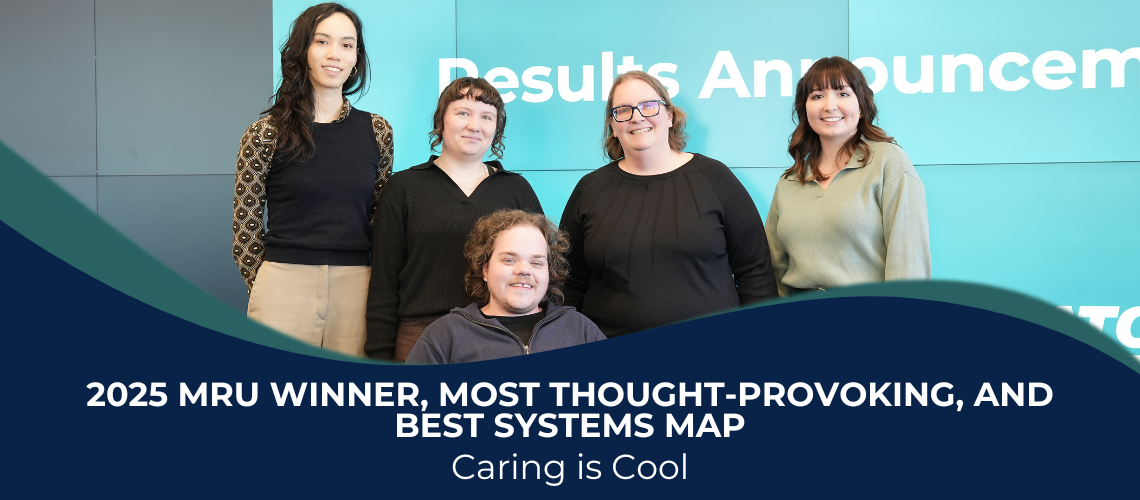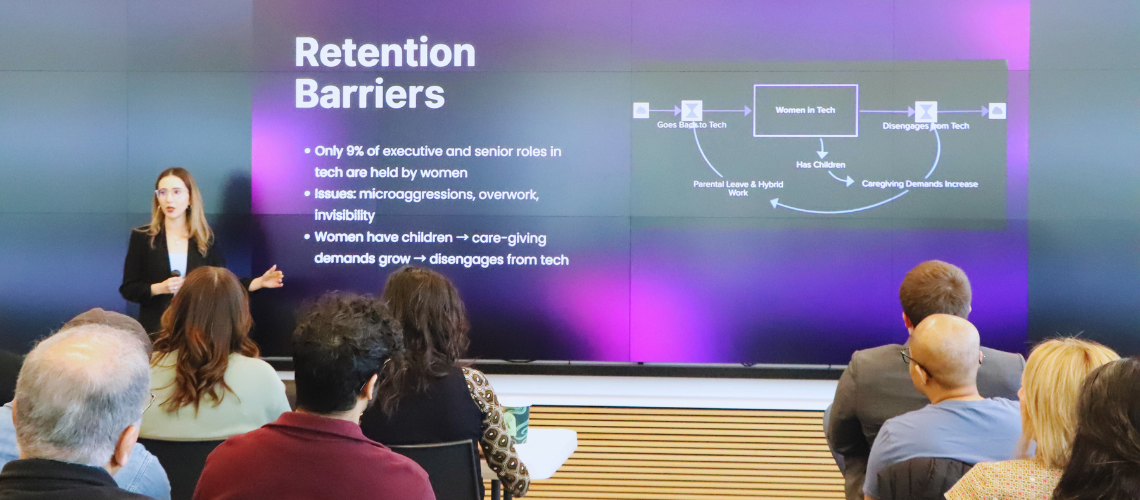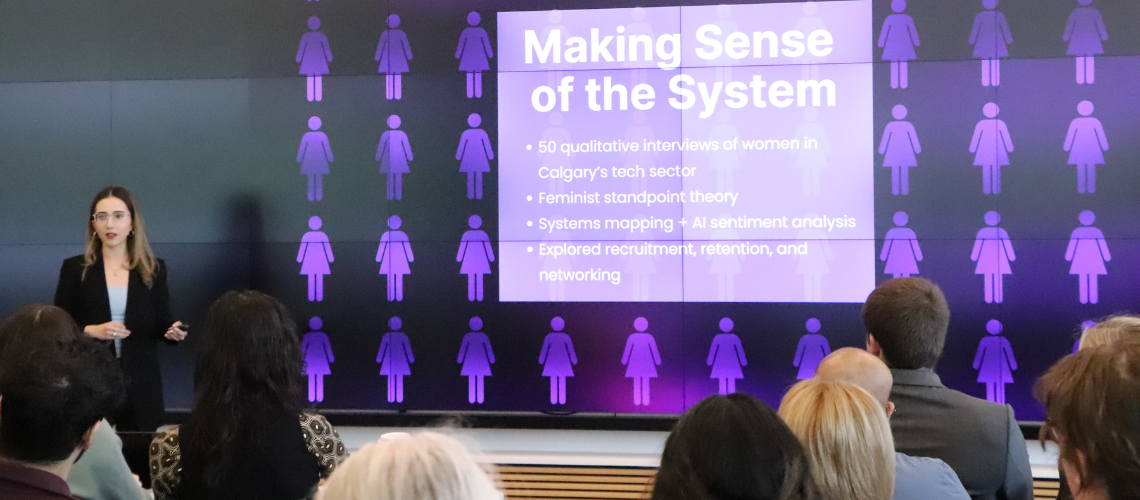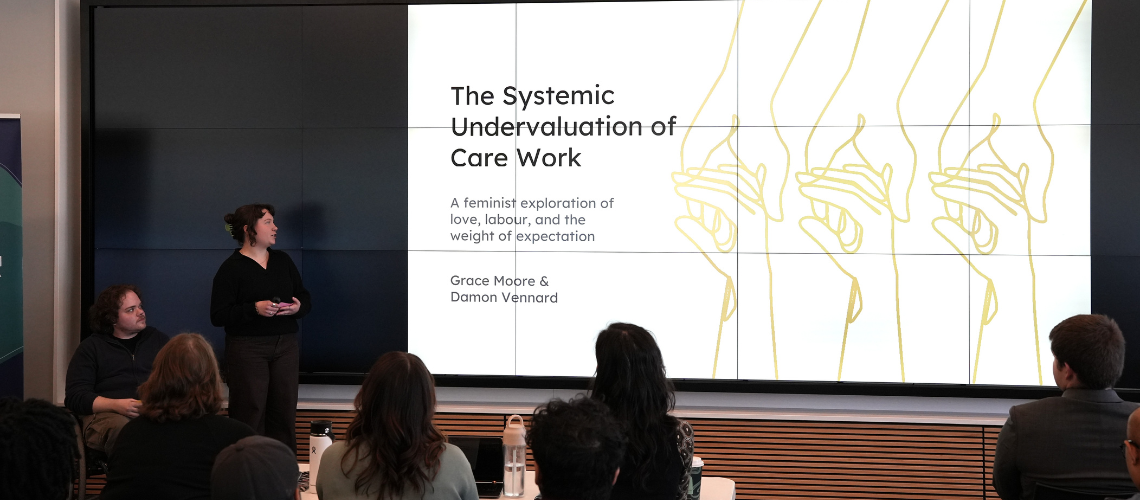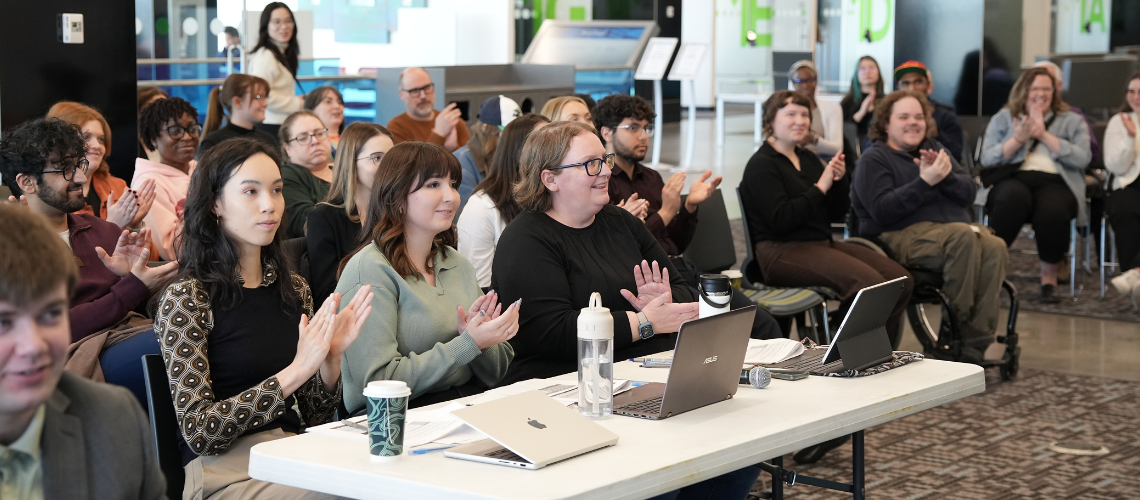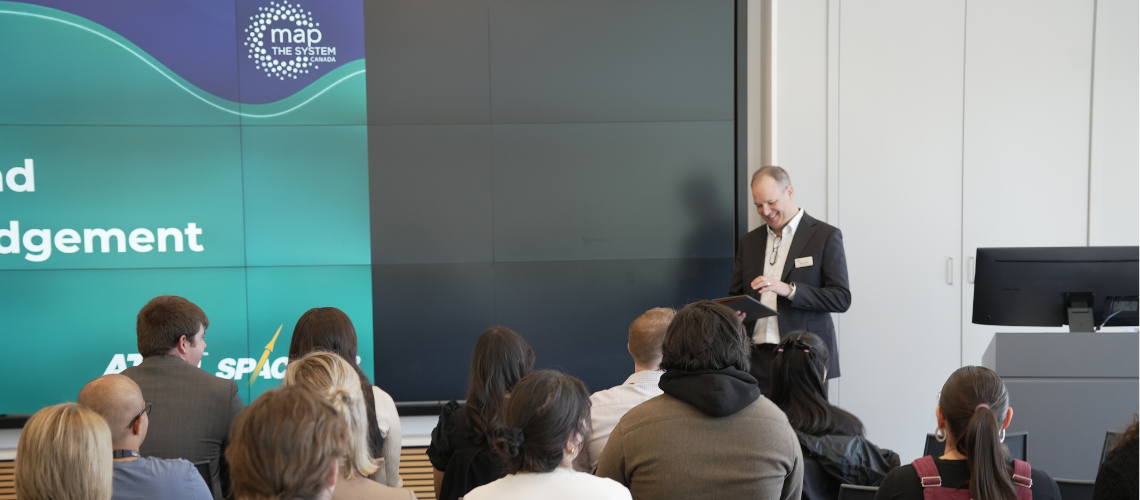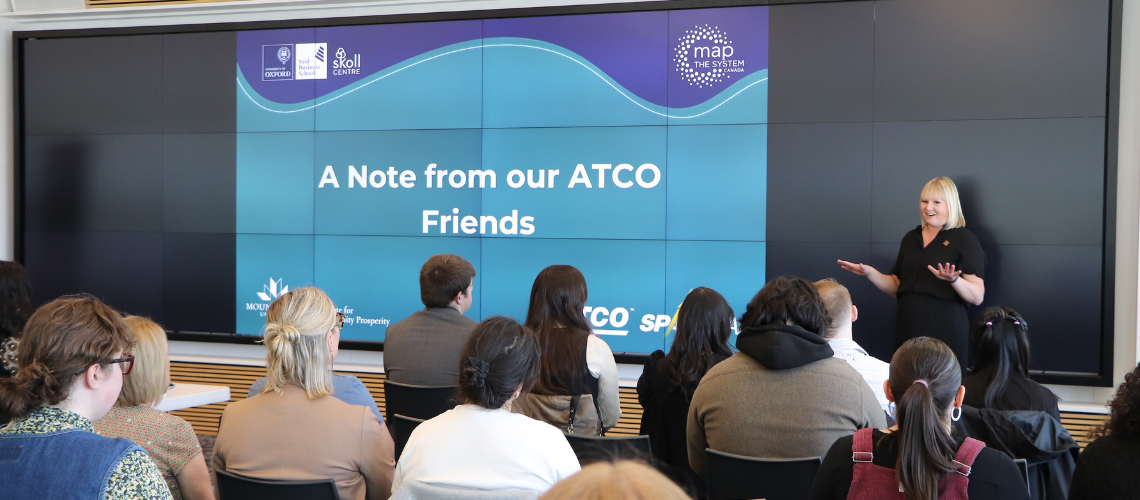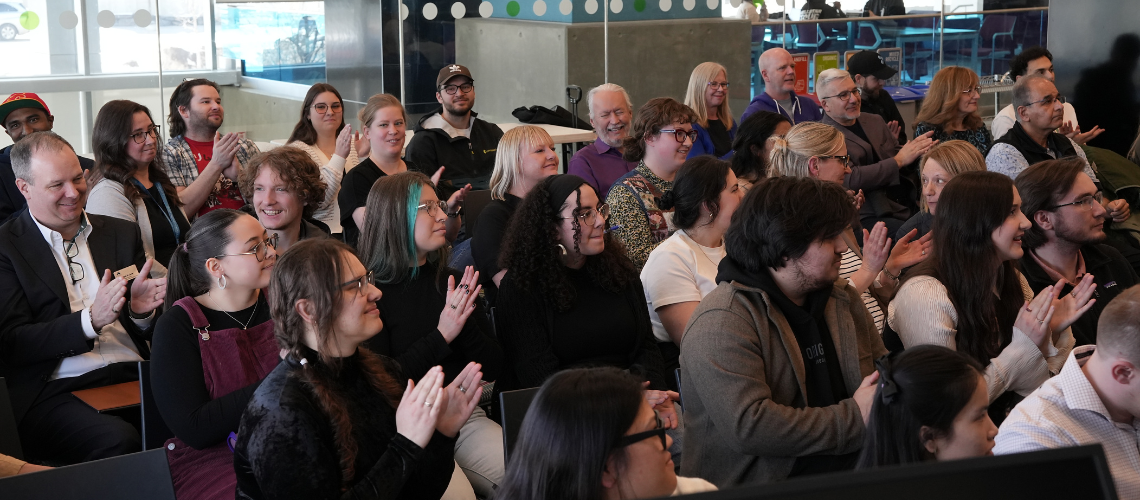Celebrating Our 2025 Map the System Campus Finalists!
Posted April 11, 2025 - Linh Bui
Support our students as they share their findings and research and continue to push their understanding of complex systems.
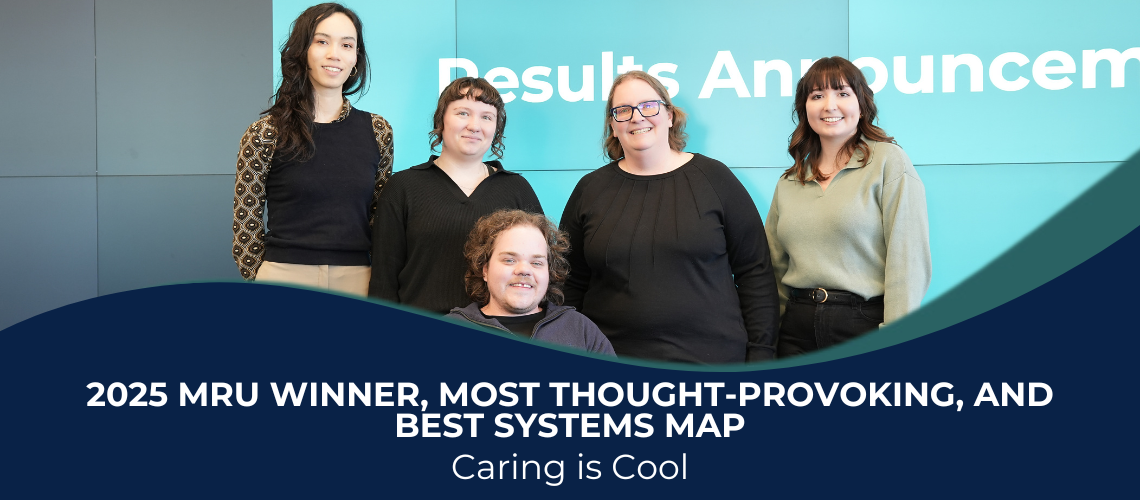
We are thrilled to shine a spotlight on the incredible students who showcased their systems thinking, enthusiasm, and research throughout the 2025 Map the System MRU Campus Final.
There was a record number of 20 student teams that submitted projects this year. Nicole Darnayla, the campus lead, and Dr. Katharine McGowan, the main educator and mentor of the program, remarked on the positive uptakes in students’ engagement.
“This year, we had the most submissions that were all done very well from across MRU departments. Some were related issues, some were polar opposites. However, the perspectives of which each submission came from varied.
This year being our highest submission rate can indicate that systems thinking is slowly but surely becoming a skill that MRU students are developing and it is very exciting to see! We had amazing submissions this year, but only one can represent MRU at the national and global level. We are very excited for next steps of Map the System and we hope everyone tunes in to support team Caring is Cool as they represent MRU.”
Congratulations to Our Finalists and Winners
Of those entries, six teams were selected to present their systems analyses at the campus final on April 4th. Each team chose a complex problem, seeing it through systems thinking lenses to find root causes, patterns, and opportunities for meaningful change. Topics ranged from social justice and public health to equity in tech and caregiving—demonstrating the depth and breadth of thinking by the students at MRU.
We are delighted to announce that team Caring is cool: Grace Moore and Damon Vennard, with their excellent project on The Systemic Undervaluation of Care, were chosen as the Top MRU Campus Team and will be representing MRU at the Map the System Canadian Final held during the Banff Systems Summit on May 19, 2025.
We also want to recognize the incredible work and insight contributed by our other top student teams. Their passion and research are vital in fostering student-driven changemaking on complex issues through a systems thinking lens:
-
- Dana Dutton, Hallie Vermette, and Naheel Al Sourani – Why are Youth in Canada Disconnected?
- Isaiah Haughton – Disinformation and Misinformation in Canada After the Pandemic
- Katelyn Bennett, Isabel Melendez, Cristina Nguyen, Matthew Rennick, and Zakari Mulrooney – Canadian Nurses' Experiences of System-Level Betrayal: A Review of the Effects of Organizational Failures and Misaligned Policies in Healthcare
- Mohamad Kamel, Cameran Christianson, and Laura Gonzalez – Uncovering the Systems of Intimate Partner Violence in BIPOC Communities in Canada
- Dana Dutton, Hallie Vermette, and Naheel Al Sourani – Why are Youth in Canada Disconnected?
-
- Nicole Ranieri – Cracking the Code of Women in Tech
Most Impactful Storytelling and Most Impressive Research
Nicole Ranieri captivated audiences and judges alike with a systems analysis, Cracking the Code of Women in Tech, earning both Most Impactful Storytelling and Most Impressive Research awards. Her presentation involved historical context, systemic barriers, and the integration of lived experiences of 50 women in STEM disciplines. Citing recruitment challenges, retention problems, and disparities in networking and sponsorship, Nicole exposed how deeply embedded norms continue to shape—and restrict—the tech industry.
She not only identified the problem; she also proposed systemic solutions:
- Hiring shifted from "culture fit" to "culture add"
- Redesign jobs to emphasize flexibility and invisible labor
- Rethink mental models like "meritocracy" that mask structural inequities
Her work is an example of the application of systems thinking to catalyzing inclusive innovation.
Most Thought-Provoking, Best Systems Map, and Top MRU Team
With a compelling question mark—"Who cares about care?"—Grace Moore and Damon Vennard confronted the urgent issue of undervalued care work. Their project offered a reflective analysis of how dominant social norms, gender roles, and mental models support the systemic undervaluation of required caregiving labor.
Through coherent stakeholder and systems maps, front-line caregiver interviews, and a feminist, intersectional analysis, they revealed:
- The economic insecurity and burnout faced by caregivers
- The built-in gendered norms of care roles
- The hidden costs of underfunding care as infrastructure
Their solution advocated for system change:
- Normalize flexible work to care for caregivers
- Address the "care penalty" through policy and public investment
- Shift public consciousness to value care as essential, not additive
These maps were thoughtfully crafted, effectively capturing the nuances of the underlying norms and patterns—earning them the award for Most Impressive Systems Map.
This dynamic systems exploration also earned them both Top MRU Campus Team awards and Most Thought-Provoking Project — an audience-voted award decided live, right after all the presentations.
A Community of Support
This year’s final featured a distinguished panel of judges, including past global Map the System winners and experts in systems thinking, public policy, and industry. We are deeply grateful to Heather Nelson, Kaitlyn Squires, and Jillian Mah for their time, insight, and care for student work.
Special thanks as well to Adam Cave, Vice Dean, Academic (Faculty of Business, Communication Studies, and Aviation), who emphasized the value of systems thinking in education:
“We are living in an increasingly complex and ambiguous world, and the concept of Map the System is really important—foundational, even. It prepares our students not just for graduation, but to contribute meaningfully to the challenges of the future.”
We also extend heartfelt appreciation to our friends, Alicia Tropak, Director of Transformation at ATCO, and the many ATCO team members who attended in support of our student changemakers. Their continued sponsorship support is what makes this platform for students changemakers possible.
And THANK YOU for your support because it has enabled continuous support for student changemakers and shout out systems thinking in action in our community.
Looking Ahead
Campus Lead Nicole Darnayla summed up the event nicely:
"There's so much to learn when you look at these issues up close from different perspectives. The effort and passion that goes into these projects is truly inspiring. It is reassuring to see that so many students are passionate and committed to making positive impacts with systems thinking.
To be a student is to learn, but to value change and choosing to be a changemaker means being a leader. With this year’s campus final, I have no doubts in the leadership of MRU students."
We are so proud of all 20 teams who took part in Map the System 2025 at MRU. Your efforts matter, and your commitment to working on messy problems using a systems lens is already building a wiser, fairer, and more interconnected future.
Stay tuned as Grace and Damon prepare to represent MRU on the national stage at the Banff Systems Summit on May 19, 2025. Learn more and register for a day pass to cheer on the team as they present live alongside top teams from 10 other Canadian post-secondary institutions—or join us for the full Summit experience, exploring systems thinking and community learning in beautiful Banff.
"I would invite everyone to attend the Canadian Final or systems thinking related event because you never know how much there is to an issue until you bring that systems approach to it." — Alita Vaz, Campus Program Lead 2024
"There is a lot of buzz about 21st century skill sets, often summarized as critical thinking, collaboration, creativity, and communication. Map the System asks students to draw on all of these skill sets in a way that gets students thinking about problem-solving, but specifically in the context of real-world complexity."
- Student Guide to Mapping a System, 4th Edition.







